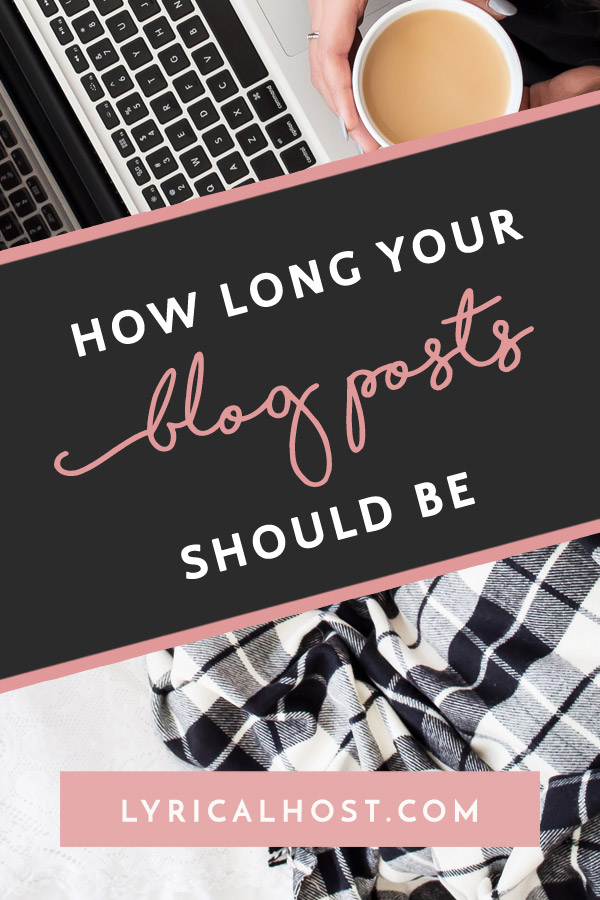One of the most common questions asked by new bloggers is, “How long should my blog post be?”
It’s a topic a lot of people have strong opinions on, but the truth is that there’s no one size fits all answer. However, there are some tricks to deciding how long any specific blog post should be, starting with considering the following:
The topic
Some topics are super involved and will naturally require more explanation, whereas how tos or round ups often have much shorter word counts due to the number of images and the fact there’s not much explanation needed. Affiliate posts may be long if you’re introducing someone to a product and convincing them to buy it, or much shorter if they’re already familiar with it and you’re just trying to get them to click. If you work with an ad network that pays based on impressions, you’re likely to want longer blog posts because that way you can include more ads without annoying your readers (or Google).
Search engine optimization
Contrary to popular belief, there’s no magic number for the ideal length of your post (although there is an ideal minimum word count). This is partly because there are just so many factors involved in ranking, it’s impossible to make any watertight conclusions on specific word counts. However, there are potential trends, and ways we can get a rough guide, which are explained later on in this post.
Your user
Some people prefer long posts, some people prefer short. In some cases the audience can indicate what post length you should go for. For example, if you’re writing for an audience with little time (e.g. parents wanting quick advice), your posts are likely to be shorter compared to an audience that wants depth (e.g. web developers wanting all the minute details involved in an advanced technique).
The golden rule of blog post length
The most important thing is that you’re fulfilling the needs and expectations of the person likely to be reading your post. This can be difficult in situations where you’re serving multiple needs/audiences, but there are ways you can accommodate everyone. For examples of this in action, take a look at How To Make Your Recipe Posts More User-Friendly.
The minimum word count for a blog post
General advice from is that your posts/pages should be at least 300 words long. (Don’t worry about a handful of standard pages being shorter than that, e.g. your “Contact” page, because you’re not trying to rank those in Google anyway).
The 300 word minimum is because a lot of short pages on your website can be seen as “thin content”, i.e. junk content historically used to game search engines, back when people used to create thousands of very short keyword-heavy pages to increase their chances of appearing in search results. A few short pages is fine, but a lot of short pages (or high ratio of short pages to long pages: for example you have 20 posts and 17 of them are super short) across your overall site can be a red flag to Google and lead to your site being penalized or pushed down the search engine rankings.
For blog posts specifically, it’s good practice to have at least 500 words. This is because you’re writing to explain or express something useful or interesting, and it’s hard to do that in fewer words. If you’re struggling to write more than 300 words, it’s a strong indicator your topic is too narrow or perhaps that you need to research more about it.
If you’ve already published a lot of short posts/pages, simply update them as soon as you can (or merge them if it makes sense so you have a smaller number of longer pages), and resubmit your sitemap to Google.
The maximum word count for a blog post
At this point we’re getting into “it depends” territory. Some people will swear by specific word counts, mostly commonly anywhere between 1500 to 2500 words, and this has logic behind it: longer posts are often more useful because they contain more information, hit more keywords and phrases, and encourage people to spend longer on the page. These are all positive benefits for search engine rankings.
While there’s theoretically no minimum or maximum length, one idea is to search the keywords you’re planning to use in your post and take a look at the top ten results. If they’re all long posts, chances are a long post is a good idea. But don’t take this as gospel; so many factors go into ranking a page that post length is just one small factor.
Another important point to remember is that longer doesn’t necessarily equal better. A post that answers the user’s question or intent is always the goal. There’s no point rambling for the sake of it – just say what’s needed. There’s also no point setting yourself fixed word counts and then getting stressed or padding posts out to meet them. A variety of different length blog posts is good because they look more natural.
If you start writing and your post ends up becoming super long, try turning it into a series. For example, if you’re writing about search engine optimization, your first part could be keyword research, the second post could be content writing tips, and the third could be promoting your post and getting links to it. Going back and adding links between all posts in the series not only creates nice internal links, it also helps lower your bounce rate as readers progress through different parts.
In summary
Aim for blog posts of at least 500 words as an absolute minimum, and try to avoid going over 3000 words for a single post. If you’re struggling to find much to say, chances are your topic is too narrow. Conversely, if you’re up to thousands of words with no end in sight, chances are your topic is best as a series or an ebook. Sometimes you may not realize your topic is too narrow or too broad until after you’ve started writing, but it’s always fixable, so don’t worry! Headings and lists are always useful for this: you can integrate keywords easily and lengthen your content more, and in longer posts they break up the text logically so it’s easier to digest.
Pin for later:







Pingback: Blogging 101: "How Often Should I Publish A New Post?" - Lyrical Host